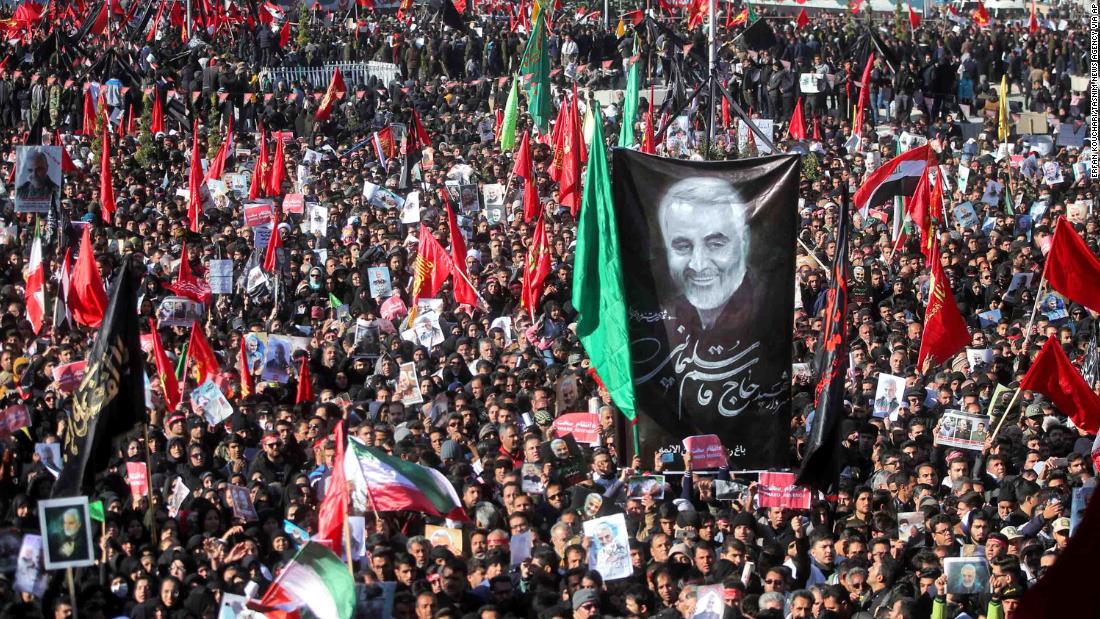American forces killed Iran’s most-revered military leader at the Baghdad airport. Iran, vowing revenge,
announced it is suspending certain commitments made in the nuclear deal — a frightening possible first step toward developing nuclear weapons. The US, preparing for retaliation,
has suspended its fight against ISIS terrorists. The Iraqi government, already under Tehran’s sway,
may soon ask US forces to leave the country. In confirmation that all is chaos, the Pentagon mistakenly sent a letter that explained America’s immediate departure to Iraqi officials. Turns out we’re
not leaving just yet.
All of this is happening because Trump, with no obvious Iran policy other than hostility toward the old status quo, is treating the world as his political toy. He is either certain that he can create peace through mayhem or he is trying, for the second time, to use a foreign adventure to secure his own re-election.
As we all know, Trump stands as only the third president ever impeached over his withholding of aid to Ukraine in an effort to get it to announce an investigation into his political opponent. What lesson did he learn from this disgrace? Did he simply learn that he had to act more boldly?
The chaos began when a series of lethal skirmishes between US forces and Iranian-backed militias culminated in hundreds of pro-Iranian protesters
forcing through the gates at the
US Embassy compound in Baghdad. As they retreated, they left behind a demolished
reception building, evocative of the 1979 hostage-taking at the US Embassy in Tehran, which likely ruined Jimmy Carter’s chance at re-election.
Tension grew and came to a head when Trump chose the
most extreme action against Iran, despite skepticism from some in his administration: the targeted killing of General Qasem Soleimani, Iran’s military leader. This was a decision that could have been made by Barack Obama and George W. Bush, but neither did. According to an official cited by the Times, Soleimani was conducting “business as usual” when Trump ordered him killed, citing an imminent threat.
A leading enemy of America and its allies Israel and Saudi Arabia, the general personified Iranian aggression. As the Times reports, there was some intelligence indicating there was a threat to US forces, embassies and consulates in Iraq, Syria and Lebanon, though the significance of this intelligence was
unclear to the officials.
But while killing Soleimani might feel justified or even good to some Americans, it won’t be much of a problem for Iran. Soleimani
has been replaced and the state of conflict will likely be unchanged except for the fact that the Iranian people and their supporters will be enraged and inspired toward revenge. Iran’s security forces have already
vowed to avenge their leader’s death. Martyrs are powerful figures and thus, in death, Soleimani might inspire Iranians to support renewed confrontation with the US.
It is difficult to imagine an analogous act against the United States, but Iranians might say that the killing of Soleimani represents something like a lethal attack on, say, a famous leader in the US military. Consider how Americans would respond to such an incident and you begin to understand why previous decision makers, acting on intelligence that had tracked his every move for years, didn’t choose the option to kill Soleimani.
As Donald Trump’s rockets rained down on Soleimani’s convoy, the world instantly became more dangerous and America’s role in the Middle East became less certain. Having invaded on faulty claims that Iraq possessed weapons of mass destruction and was culpable in the 9/11 attacks, America’s war in Iraq cost
hundreds of thousands of lives and trillions of dollars. It’s safe to say that the entire world is sick of America’s wars in Muslim lands. The prospect of the US engaging in more conflict, now with Iran, is almost unimaginable.
And yet, with Donald Trump in the White House, what has come to pass feels inevitable. It is his habit to express simplistic and even crazy views of complex problems and suggest a sloganeer’s solution. During the 2016 campaign he
floated the idea that Syrian refugees could be a secret invading army and pledged to remove them all.
Upon his election he tried to institute a “
Muslim ban” on travelers coming to the US from certain nations — many that are predominantly Muslim.
He then commenced bashing America’s allies,
especially NATO, while
taunting dangerous enemies like North Korea.
In his refusal to, as one might put it, “act presidential,” he practically affirmed the widespread fear that he couldn’t function as a sensible leader of the most powerful nation on earth.
Among the traits that make Trump unfit for his job is his inability to anticipate consequences. In one foreign misadventure, Trump risked Ukrainian lives by delaying war aid and paid a price when the House voted to impeach him. In another foreign misadventure, he’s taken a far greater risk that seems guaranteed to cause great bloodshed and a reordering of the Middle East in favor of Iran. And since Americans are keenly aware of the losses the nation has endured in the region already, it’s hard to imagine they will back Trump for very long if the conflict escalates.
Trump will likely receive a bitter reward for his rash decisions. Iran could well play the pivotal role in denying yet another president re-election. And history will record that it was Trump who lost the Middle East.



